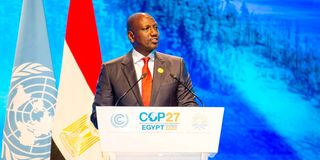Kenya set to reap from new carbon market initiative

President William Ruto addressing the COP27 meeting in Sharm El-Sheikh, Egypt.
In Sharm el-Sheikh, Egypt
Kenya is one of the African countries expected to benefit from the new Africa Carbon Markets Initiative (ACMI).
ACMI, which was launched on the sidelines of the 2022 United Nations Climate Change Conference (COP27) in Sharm el-Sheikh, Egypt, is led by a 13-member steering committee of African leaders and carbon credit experts. It is set to expand Africa’s voluntary carbon markets capabilities, in the process creating job opportunities.
It was initiated through the collaboration of the Global Energy Alliance for People and Planet (GEAPP), Sustainable Energy for All and the United Nations Economic Commission for Africa.
ACMI targets the growth of voluntary carbon markets in the continent to produce 300 million carbon credits annually by 2030, and 1.5 billion credits annually by 2050. This is expected to unlock over Sh700 billion in revenue by 2030.
Joseph Nganga, ACMI’s steering committee member and Vice-President, Africa at GEAPP, called for collaboration among governments, developers and buyers to develop the voluntary carbon markets in the continent.
ACMI is also working with major carbon credit buyers and financiers, such as the Exchange Trading Group, Nando’s and Standard Chartered to stimulate the production of high-integrity credits. It is collaborating with global integrity initiatives like the Integrity Council for the Voluntary Carbon Market and the Voluntary Carbon Markets Integrity Initiative, and other regional carbon market platforms.
ACMI steering committee member and USAID Chief Climate Officer Gillian Caldwell said the African voluntary carbon market will only succeed if people trust that African credits are driving real climate action and having a positive human impact.
But even with such initiatives, there are challenges in the carbon market, especially in the developing world. In a previous interview, Eddie Soleymani and Shidan Gouran, co-founders of BlueSphere Carbon Exchange, a global carbon trading platform, noted that in most cases the certification processes for these credits are not mandated by law.
“This means that there is unreliable demand for the certificates and markets in them suffer from poor liquidity, so investors can’t tell whether the price they are being offered is a good one. For the average investor, they are often almost impossible to sell.
“That is why, as a company, we have come up with a way to enable spot trading of environmental credits that can be bought and sold, providing credit holders an easy way to liquidate their credits to a pool of qualified purchasers,” they said.
Several African nations, including Kenya, Malawi, Gabon, Nigeria, and Togo, committed to collaborating with ACMI to scale up carbon credit production via voluntary carbon market activation plans.
Speaking to the Nation, President William Ruto said: “We are going to leverage technology for solutions which include carbon credits,” he said.
$350 million kitty
Meanwhile, Kenya is among the beneficiaries of a $350 million kitty to tackle climate change. The Nature, People and Climate Investment programme (NPC), launched by Climate Investment Fund (CIF), will benefit select developing countries.
The announcement was made by CIF chief executive Mafalda Duarte. She congratulated the first group of countries that will funds raised by Italy, United Kingdom and Sweden.
Other countries set to benefit are the Dominican Republic, Egypt, Fiji, Zambia, Malawi, Mozambique, Namibia and Tanzania.
NPC will focus on promoting and protecting natural environments integral to climate action, sustainable agriculture and food supply, healthy forests, resilient coastal systems and empowering indigenous people and local communities. This includes supporting the first group of participating countries to meet some of their most pressing climate challenges.
NPC investment in Kenya will support sustainable forest management and water tower protection and restoration in Mt Elgon and Cherangany areas.
This story was produced as part of the 2022 Climate Change Media Partnership, a journalism fellowship organized by Internews' Earth Journalism Network and the Stanley Center for Peace and Security.
Additional reporting by Sylvia Muia with support from Climate Tracker






